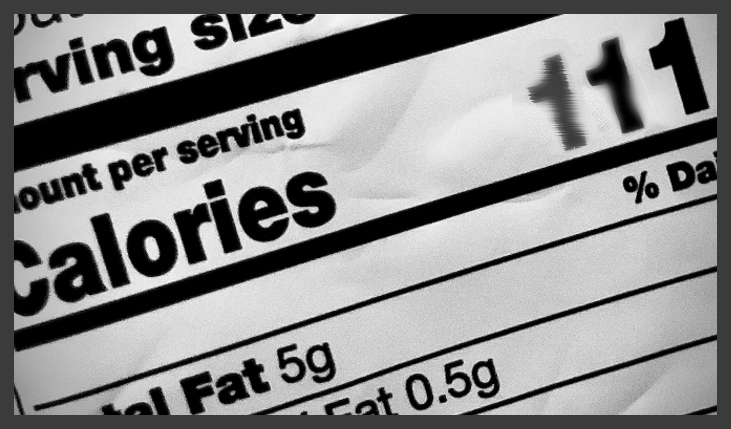What were we talking about? Oh, now I remember. Let me apologize. I have been on a calorie restrictive diet for a long time now. It affects my mind in mysterious ways.
Continuing from “Calories II,” Let’s talk about diet.
I now view food through an educated or at least experienced lens that allows me to see food as more than a pretty logo or a pleasing mouth feel. I want to help anyone who is struggling to understand food get to a basic level of understanding. That I guess has become the overarching theme and goal of this series. A lack of education (and our stubbornness sometimes as Americans to learn) is what I have observed as a low barrier that prevents so many people from living healthier lives. I can not blame the majority. As consumers in this capitalistic society, we are often fed, figuratively and literally, the wrong things. Let’s take a step toward clarifying this today.
I mentioned in the first part how eating a carb rich meal can often lead to being more hungry. I want to talk briefly (anecdotally) about how we should perceive hunger.
We can learn to understand our body’s needs without being slaves to cravings. Recognizing when our bodies are simply sending hunger stimulus and when our bodies are in need of nourishment. Eating to satisfy an emotion or eating when in a calorie deficit often leads us to overeat because our hormones are not in balance. I have also noticed that sleep has a significant role to play toward this balance. More on this another day.
Take a step back and observe those cycles of hunger. Learn what triggers bad habits. If you have a snack now, will you be able to control your hunger till dinner? Maybe you are not hungry but bored. Maybe you are not hungry but dehydrated. Learn to be better than spontaneous habits. We are behind the wheel. Do not let the chimp part of your brain drive from the backseat. Monkeys can not drive!
They cannot even get a license, and you are going to let one drive your car? What?
There are so many diets out there to try. Some popular ones include keto, vegetarian, carnivore, paleo, pescatarian, vegan, juice, grain free, DASH, Mediterranean, intermittent, flexitarian, Weightwatchers, Atkins, and supplemental diets just to name a few.
Now, which is the best diet to follow? Do not let this list intimidate you. Diet is only a tool. I’m sure that I have already mentioned this is some capacity, but find a diet that works for you and allow it to give you structure. Which diet should you choose? The diet that makes you feel healthy, the diet that you can follow, and the diet that doesn’t interrupt your life. Let “control” be your guiding light. Whatever keeps the monkey in the backseat. Any diet is good with the right intention and goals.
If you are unhappy with your health, just start the one that appeals to you and learn. This is not end-all-be-all. I believe that we should be strict with our diet, but we should also adapt to new knowledge. Following any one diet does not make you healthy. It is consistently eating food that is good for your body and lifestyle, in the right proportion, that makes you healthy. Like I said, you will get it wrong at first, but if you work at it and learn as you go, you will see results. Now I am going to narrow this conversation and leave the rest for another day. Trust me, that day will come.
For someone that is unhappy with their weight (over or under), I mentioned starting a diet. I think that there is only a correlation between diet and weight loss. Obviously, diet ultimately causes weight loss, but I think it is the knowledge, understanding, and discipline that people on a diet learn that provides a lifestyle for change. It is a refined lifestyle that makes someone healthy. I will find some evidence of this… give me a moment…
“In summary, dietary tracking was found to be an important component of successful weight loss” (Ingels).
“Regardless of assigned diet groups, 12-month weight change was greater in the most adherent compared to the least adherent tertiles” (Alhassan).
“Adherence to diet, weight loss and weight-loss satisfaction, measured during the late weight-loss phase, are associated with weight-loss maintenance” (Calugi).
This evidence does not entirely support my claim, but diet adherence does appear to have a strong correlation with weight loss.
Now let me give you my experience: I am a vegan, yes? I am a vegan… yeah, “a vegan.” Another lifeform that is satisfied by the soil-born calories and rejects animal products for sustenance. I will let you unpack that for a minute… Does this mean I think being vegan is the best approach toward diet? I will make a whole post related to this because veganism and the “plant based” world is so fascinating. Although I personally have found success here, please explore to find what works for you.
Many of us have heard the stories from friends and family of someone who became x or y and changed their life. Being vegan ironically makes it more difficult to lose weight if we look at it logically from a surface level. Less options does not equal better food. Vegetables and healthy snacks were never previously excluded. Reducing options does make us more likely to avoid the less healthy option we excluded but also the healthier ones.
What I have learned is that someone who is willing to make this type of sacrifice and commit to dieting is also someone who is more likely to change their life. There is some deeper psychology to dieting that I will not pretend to be able to express today. I can not say whether it is the same initial desperation that prompts someone to start a restrictive diet that ultimately leads them to success or if it is the act of dieting that promotes greater discipline and determination over the long term. All that I can say is that those who can find a diet that works for them and stick to it are going to be the ones that find results.
Now, for the reveal!–My ideal diet would consist… well I do not know conclusively, and have you not been listening? You must find your own ideal. I will suggest whole plant based foods (think vegetables, nuts, legumes, mushrooms, and fruit). Because I could not live without them, I also must add plant based proteins (powders and other related products). To a lesser degree (I might be biased), I will also add high quality meats and eggs to this list.
This will be the last of the “calories” series. There are so many topics that I want to talk about that have spurred from this initial dive into nutrition. Expect more health posts to come in the future. I will take a break from nutrition for the next few weeks.
I will leave you with this till next week: What do you think is more important? A life of freedom or a life of commitment?
This has been Tristan from HQ. I’m out y’all!
Citation
Alhassan, S, et al. “Dietary Adherence and Weight Loss Success among Overweight Women: Results from the A to Z Weight Loss Study.” Nature News, Nature Publishing Group, 12 Feb. 2008, www.nature.com/articles/ijo20088.
Calugi, Simona, et al. “The Association between Weight Maintenance and Session-by-Session Diet Adherence, Weight Loss and Weight-Loss Satisfaction – Eating and Weight Disorders – Studies on Anorexia, Bulimia and Obesity.” SpringerLink, Springer International Publishing, 21 June 2018, link.springer.com/article/10.1007/s40519-018-0528-8.
Ingels, John Spencer, et al. “The Effect of Adherence to Dietary Tracking on Weight Loss: Using HLM to Model Weight Loss over Time.” Journal of Diabetes Research, Hindawi, 9 Aug. 2017, www.hindawi.com/journals/jdr/2017/6951495/.


